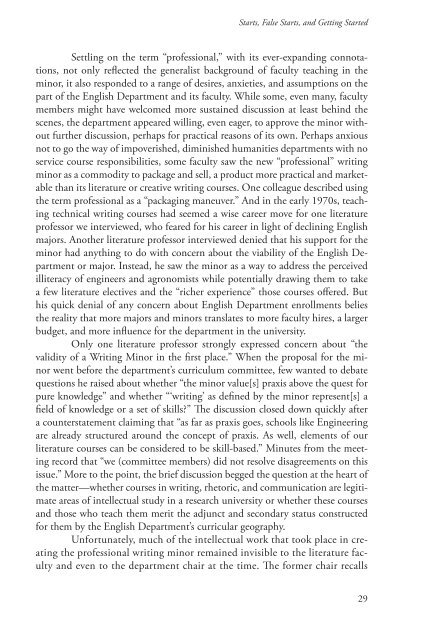Design Discourse- Composing and Revising Programs in Professional and Technical Writing, 2010a
Design Discourse- Composing and Revising Programs in Professional and Technical Writing, 2010a
Design Discourse- Composing and Revising Programs in Professional and Technical Writing, 2010a
You also want an ePaper? Increase the reach of your titles
YUMPU automatically turns print PDFs into web optimized ePapers that Google loves.
Starts, False Starts, <strong>and</strong> Gett<strong>in</strong>g Started<br />
Settl<strong>in</strong>g on the term “professional,” with its ever-exp<strong>and</strong><strong>in</strong>g connotations,<br />
not only reflected the generalist background of faculty teach<strong>in</strong>g <strong>in</strong> the<br />
m<strong>in</strong>or, it also responded to a range of desires, anxieties, <strong>and</strong> assumptions on the<br />
part of the English Department <strong>and</strong> its faculty. While some, even many, faculty<br />
members might have welcomed more susta<strong>in</strong>ed discussion at least beh<strong>in</strong>d the<br />
scenes, the department appeared will<strong>in</strong>g, even eager, to approve the m<strong>in</strong>or without<br />
further discussion, perhaps for practical reasons of its own. Perhaps anxious<br />
not to go the way of impoverished, dim<strong>in</strong>ished humanities departments with no<br />
service course responsibilities, some faculty saw the new “professional” writ<strong>in</strong>g<br />
m<strong>in</strong>or as a commodity to package <strong>and</strong> sell, a product more practical <strong>and</strong> marketable<br />
than its literature or creative writ<strong>in</strong>g courses. One colleague described us<strong>in</strong>g<br />
the term professional as a “packag<strong>in</strong>g maneuver.” And <strong>in</strong> the early 1970s, teach<strong>in</strong>g<br />
technical writ<strong>in</strong>g courses had seemed a wise career move for one literature<br />
professor we <strong>in</strong>terviewed, who feared for his career <strong>in</strong> light of decl<strong>in</strong><strong>in</strong>g English<br />
majors. Another literature professor <strong>in</strong>terviewed denied that his support for the<br />
m<strong>in</strong>or had anyth<strong>in</strong>g to do with concern about the viability of the English Department<br />
or major. Instead, he saw the m<strong>in</strong>or as a way to address the perceived<br />
illiteracy of eng<strong>in</strong>eers <strong>and</strong> agronomists while potentially draw<strong>in</strong>g them to take<br />
a few literature electives <strong>and</strong> the “richer experience” those courses offered. But<br />
his quick denial of any concern about English Department enrollments belies<br />
the reality that more majors <strong>and</strong> m<strong>in</strong>ors translates to more faculty hires, a larger<br />
budget, <strong>and</strong> more <strong>in</strong>fluence for the department <strong>in</strong> the university.<br />
Only one literature professor strongly expressed concern about “the<br />
validity of a Writ<strong>in</strong>g M<strong>in</strong>or <strong>in</strong> the first place.” When the proposal for the m<strong>in</strong>or<br />
went before the department’s curriculum committee, few wanted to debate<br />
questions he raised about whether “the m<strong>in</strong>or value[s] praxis above the quest for<br />
pure knowledge” <strong>and</strong> whether “‘writ<strong>in</strong>g’ as def<strong>in</strong>ed by the m<strong>in</strong>or represent[s] a<br />
field of knowledge or a set of skills?” The discussion closed down quickly after<br />
a counterstatement claim<strong>in</strong>g that “as far as praxis goes, schools like Eng<strong>in</strong>eer<strong>in</strong>g<br />
are already structured around the concept of praxis. As well, elements of our<br />
literature courses can be considered to be skill-based.” M<strong>in</strong>utes from the meet<strong>in</strong>g<br />
record that “we (committee members) did not resolve disagreements on this<br />
issue.” More to the po<strong>in</strong>t, the brief discussion begged the question at the heart of<br />
the matter—whether courses <strong>in</strong> writ<strong>in</strong>g, rhetoric, <strong>and</strong> communication are legitimate<br />
areas of <strong>in</strong>tellectual study <strong>in</strong> a research university or whether these courses<br />
<strong>and</strong> those who teach them merit the adjunct <strong>and</strong> secondary status constructed<br />
for them by the English Department’s curricular geography.<br />
Unfortunately, much of the <strong>in</strong>tellectual work that took place <strong>in</strong> creat<strong>in</strong>g<br />
the professional writ<strong>in</strong>g m<strong>in</strong>or rema<strong>in</strong>ed <strong>in</strong>visible to the literature faculty<br />
<strong>and</strong> even to the department chair at the time. The former chair recalls<br />
29


















